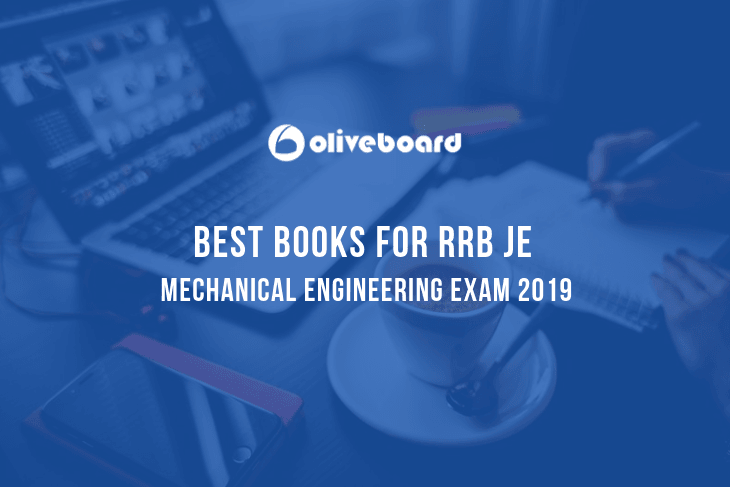The RRB JE examination is one of the most challenging government exams you can opt for. However, at the same time, if you manage to get through, you will be able to reap many benefits in the end. That is why it is one of the most popular options when it comes to government jobs for graduates.
In order to get through the RRB JE exams, you should always refer to the best books available online or in the market.
Books for RRB JE Mechanical Engineering exam 2019
Here is a list of books for RRB JE Mechanical Engineering 2019 exam, recommended by experts and exam toppers-
- Mechanical Engineering- Objective (Engineering and Railway Competitive Exams) (Diploma) (Model Test Papers)- by Upkar Publications
- RRB Railway Recruitment Board Mechanical Engineering Practice Workbook- by GK Publications
- Mechanical Engineering (RRB) Senior Section Engineer 2015 Recruitment Examination (Practice Papers) – by GK Publications
- RRB (Railway Recruitment Board ) 2019- Junior Engineer CBT I and II – Mechanical and Allied Engineering by GKP
- Indian Railways JE Mechanical Recruitment Exam – by Arihant
- RRB Mechanical Engineering Practice Workbook- Old Edition: including solved papers – Pratiyogita Kiran
- Mechanical Engineering (Objective type)- by R.S. Khurmi
- Guide to Railway Recruitment Board Junior Engineer- Mechanical Engineering- by Disha Publications
RRB JE exam pattern
Knowing the exam pattern of the RRB JE examination will help you score high marks, as you will be able to solve sufficient sectional practice sets and mock sets. The exam is divided into three parts- 1st Stage CBT, 2nd Stage CBT and the Medical Examination/ Document Verification.
RRB JE 1st Stage CBT exam pattern
| Subjects | Total Number of Questions | Duration |
| General Science | 30 | 1 hour 30 minutes |
| General Awareness | 15 | |
| Reasoning and General Intelligence | 25 | |
| Mathematics | 30 | |
| Total | 100 marks for 100 questions |
RRB JE 2nd Stage CBT exam pattern
| Subjects | Total Number of Questions | Duration |
| Technical Abilities | 100 | |
| Pollution Control and Basics of Environment | 10 | |
| Basics of Computers and Applications | 10 | 2 hours |
RRB JE Syllabus 2019
The syllabus is a bit different in the two stages hence make sure that you have a good idea about it. This will help you prepare properly and score high marks. The syllabus for the first Stage RRB JE examination is as follows:
- Mathematics
Clock and calendar, data interpretation, trigonometry, pipes and cistern, permutations and combinations, probability, square root, mensuration, speed and distance and time, time and work, alligation and mixture, partnership, elementary statistics, average, problems on age, ratio and proportion, simple and compound interest, profit and loss, percentage, algebra, geometry, HCF and LCM, number system.
- General science
Chemistry, physics and life sciences (until 10 standards)
- General intelligence and reasoning
Jumbling, mathematical operations, statement- argument, and assumptions, alphabetical and number series, syllogism, seating arrangement, puzzles, ranking and order, differences and similarities, input-output, inequality, decision making and conclusions, distance and direction, coding and decoding, blood relations, analytical reasoning.
- General awareness
Environmental issues, economy of India, geography, Indian history and culture, current affairs, railway budget, general knowledge on railways, Indian Constitution, Indian polity, committees and heads, United Nations Organization (UNO), sports, awards and honours, static general knowledge.
The syllabus for the second Stage RRB JE examination is as follows:
- General awareness
Environmental issues, economy of India, geography, Indian history and culture, current affairs, railway budget, general knowledge on railways, Indian Constitution, Indian polity, committees and heads, United Nations Organization (UNO), sports, awards and honours, static general knowledge.
- Physics and chemistry
Up to 10th standard syllabus
- Basics of computer applications
Computer virus, web browsers, websites, email and internet, different data representation, MS office, operating system, networking, storage device, input and output devices, computer architecture.
- Basics of environment and pollution control
Ozone depletion, acid rain, global warming, waste management, noise/water/air pollution and their effects, effects of environmental pollution and solutions, environment basics.
Technical abilities
- Electronics engineering
Wireless communication, microcontroller, and a microprocessor, tunnel, junctions, digital signal processing, recombination and generation of the system, EMFT, diodes, control system, energy bands, electronic circuits and devices, communication, basics of systems and signals, digital and analogue circuits.
- Electrical engineering
Signals and systems, control and power systems, circuit theory, machines, electronics and electrical instruments, measurements and circuits system, basics of power electronics and circuits, digital and analogue electronics.
- Civil engineering
Valuation, steel structures, structural analysis, soil mechanics, projections, mechanics, highway planning, hydrology, hydraulics, general civil engineering, environmental engineering, errors, and adjustments, estimating, concrete structures, building materials, structure engineering, and drawing, construction, coordinate system, curves, costing.
- Computer science engineering
Web programming, web technology, system programming, software engineering, network communication, MS office, languages, operating systems, DBMS, computer networks, computer fundamentals, algorithms.
- Mechanical engineering
Power engineering, thermodynamic cycles, heat transfer, steam tables, power engineering, machining and machine tool operations, metrology and inspection, kinematics of machines, I.C engine cycles, casting, fluid mechanics, engineering mechanics.
- Information technology engineering
UNIX, SAD, system engineering, software engineering, operating system, MS office, network and data communication, DBMS, computer organization and fundamentals, C/C++/ Java
- Metallurgical and chemical assistant
Thermodynamics, polymers, material science, measurement and instrumentation, environment and pollution control, the basic concept of fuel, computers, applied chemistry.
- Measurement and instrumentation engineering
Flow measurement, transducers, process instrumentation, industrial instrumentation, mechanical measurement, circuits, basics of measurement systems, analogue and digital electronics.
Conclusion
If you wish to score good marks, ensure that your competitive exam preparation is absolutely spot on. With the right study material and books, you will have nothing to worry about.

The most comprehensive online preparation portal for MBA, Banking and Government exams. Explore a range of mock tests and study material at www.oliveboard.in

